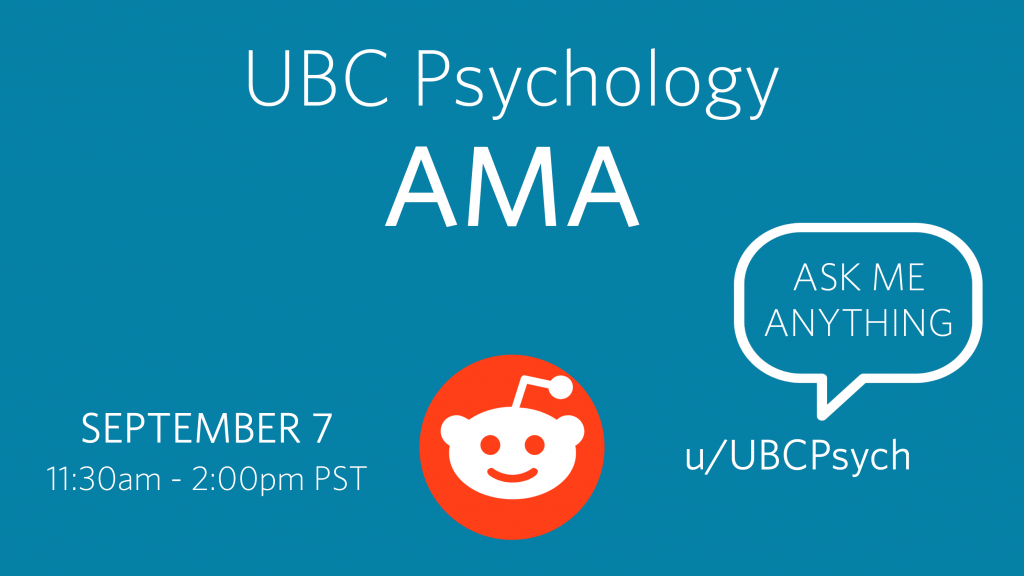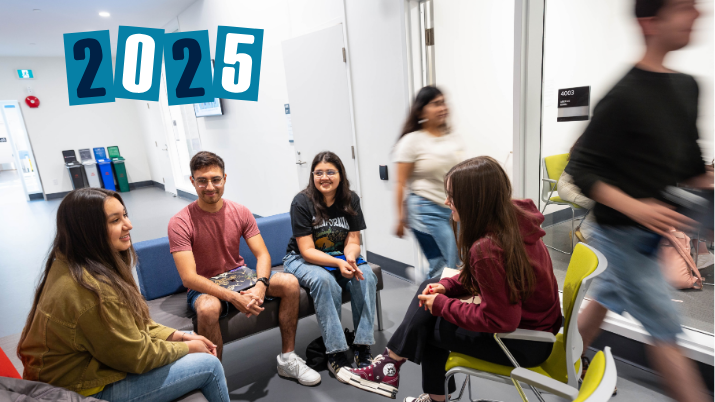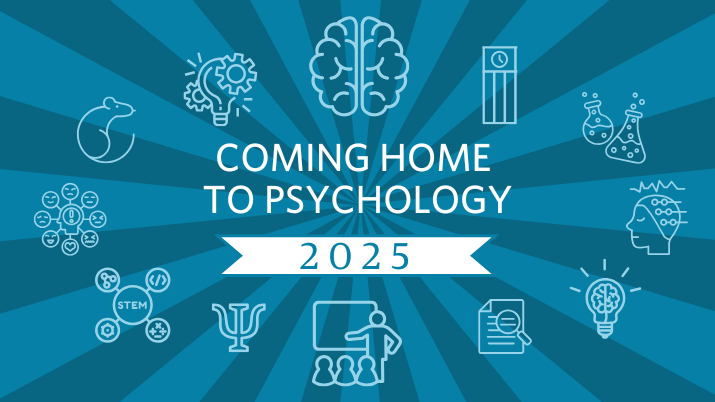

Back by popular demand, UBC Psychology is hosting another “Ask Me Anything” on Reddit as part of our Imagine UBC events and activities.
We invite new and returning students to join us and ask us questions about our programs, student resources, research opportunities, life as an RA, student clubs, and much more, in real time.
A diverse team of people from the psychology community will be responding to your questions from u/UBCPsych.
Faculty
- Kiley Hamlin, Professor, UBC Psychology
- Jay Hosking, Lecturer and BSc. Behavioural Neuroscience Program Advisor, UBC Psychology
- Eric Kim, Assistant Professor, UBC Psychology
- Darko Odic, Associate Professor, UBC Psychology
- Catherine Rawn, Professor of Teaching and Associate Head for Undergraduate Affairs, UBC Psychology
- Toni Schmader, Professor, UBC Psychology
Students
- Fides Arguelles, 4th year BA Psychology Honours Student; Co-President of UBC Psi Chi Chapter
- Natalie Brown, Clinical Psychology MA Student
- Jimmy Chokmeesuk, 3rd year BA Honours Psychology Student and Interpersonal Development minor; VP Academic, Psychology Students’ Association
- Owen Fan, BSc. Behavioural Neuroscience (2021); Lab Manager, Depression Anxiety and Stress Lab
- Kiarah O'Kane, Undergraduate Psychology Student; Lab Manager, Happy Lab
- Drake Levere, PhD Candidate in Health Psychology; Host of Brain Buzz Podcast
- Norika So, 4th year BA Honours Psychology Student; Co-President of UBC Psi Chi Chapter
- Victoria Wardell, BA, Psychology (2021), 1st year Clinical Psychology MA Student
Staff
- Nina Abizadeh, Undergraduate Program Assistant, UBC Psychology
- Tara Martin, Director, Administration, UBC Psychology
Faculty
Kiley Hamlin
Kiley Hamlin is a Professor in the Department of Psychology at UBC and Canada Research Chair in Developmental Psychology. Her work explores the earliest developmental origins of the human moral sense, by examining precursors to moral cognition and action in preverbal infants.
Ask me about:
- Research opportunities in psychology
- Honours program
- Developmental psychology area/courses
Jay Hosking
Jay Hosking is a Lecturer in UBC’s Department of Psychology where he teaches a number of courses related to neuroscience and psychology. He is also the advisor for BSc. Behavioural Neuroscience program.
Ask me about:
- The Behavioural Neuroscience program
- Courses related to neuroscience (e.g. PSYC101, 207, 301, 304, 370/371)
- The intersection between neuroscience and psychology
- How psychology is underselling itself as a rigorous scientific discipline
- How to maximize your time during undergrad
- What grad school is like
- Careers inside and outside of academia
- Balancing your academic career against your many other interests
Eric Kim
Eric Kim is an Assistant Professor in the Department of Psychology at UBC with expertise in Health Psychology. He received his PhD in Clinical Psychology and Postdoctoral training in Epidemiology. Our Lab’s Mission is to be part of a team that substantially improves the psychological and physical health of as many older adults as possible (across the racial/ethnic and socioeconomic spectrum), via rigorous research that informs the development of scalable individual-level interventions, and policies that drive systemic change in our society. In pursuit of our overarching mission, our research aims to identify, understand, and intervene upon the dimensions of psychological well-being that reduce the risk of age-related conditions. We also aim to understand the influence that the social environment has on the connection between psychological well-being and physical health. In our work we integrate perspectives from health psychology, other areas of psychology (social/personality, clinical, developmental), gerontology, social epidemiology, biology, biostatistics, and translational science.
Ask me about:
- Health Psychology
- Advice for graduate school
- Interdisciplinary research
- Advice for book recommendations around various topics (e.g., time management, presenting, etc).
Catherine Rawn
Catherine Rawn (she/her) is a Professor of Teaching and Associate Head for Undergraduate Affairs in the Department of Psychology, as well as the Chair of the Curriculum Committee for the Department as well as the Faculty of Arts as a whole. She regularly teaches students in the required research methods and statistics sequence (PSYC 217 and 218). She is a co-author on the textbook used in PSYC 217, and has published scholarly work on two-stage exams, student engagement in large classrooms, student evaluations of teaching, and the role of teaching-focused faculty at large research-intensive universities in Canada. Catherine was raised primarily by her grandmother, and was the first person in her family to attend university.
Ask me about:
- First generation student experience
- Evidence-based study and test-taking strategies
- Making the most of office hours
- Preparing for PSYC 218
- Strategies for choosing electives
- The best and worst parts of my job
- BC wine
Toni Schmader
Toni Schmader is a Professor in the Department of Psychology at UBC with expertise in Social Psychology. She is the Director of the Engendering Success in STEM Consortium, a research partnership with the shared goal to foster women’s inclusion and success in STEM. She is also Director of the Social Identity Lab, where she examines how people are affected by various social identities, stereotypes, and biases.
Ask me about:
- Research opportunities
- Tips for doing well in your courses
- Social psychology and courses available
- Advice for graduate school
Students
Fides Arguelles, Psi Chi Co-President
Fides (she/her/hers) is an incoming 4th year BA Honours Psychology student and the Co-President of the UBC Chapter of the Psi Chi International Honor Society in Psychology. She is also involved in the Directed Studies program under the supervision of Dr. Bedi at the Bedi Counselling/Psychotherapy Research, Teaching, and Service Lab. Her current study seeks to contribute to the body of research that identifies conventional psychotherapy/counselling services as culturally-dependent practices, thereby opposing dominant frameworks that assume such services as universal. Past involvements within the psychology department additionally include research assistant positions at the Emotion and Self Lab as well as the Bedi RTS Lab. Her future research interests fall under the domains of developmental and clinical psychology, and intersectional research. In particular, she hopes to one day conduct research addressing the ever increasing amount of severe mood disorders experienced by adolescents at younger ages.
Ask me about:
- Psi Chi Membership
- The Directed Studies program
- The Honours program
- Volunteering in labs
- Non-academically: go-to bubble tea order, hikes around Vancouver, and favourite coffee shops!
Jimmy Chokmeesuk, Vice President of Academics, Psychology Students' Association
Jimmy (he/him/his) is a 3rd-year BA Psychology Honours student in the Psychology Department who is also minoring in Interpersonal Development under the faculty of education at UBC and the current vice president of academics of the PSA. With the PSA, Jimmy hopes to create events that allow people to meet, connect, socialize and learn each other's stories, with a hope to ease their stress and make their university journey more enjoyable. His academic committee team brings together experts to help enhance students' professional and academic success in the UBC Psychology department. Additionally, the team also hosts the annual Psychology Undergraduate Research Conference to allow psychology students to have a conference experience. Jimmy is currently volunteering at UBC Social Health Lab. He is passionate about psychopathology and its psychotherapy, in which he hopes to better the system and psychotherapy that overlook transgender, non-binary, and gender-nonconforming people’s diverse lived experiences. Jimmy also takes inclusion and diversity very seriously to ensure that he does not leave anyone on this journey alone. In his spare time, he loves reading a good book, cooking Thai food and volunteering at a non-profit organization.
Ask me about:
- Psychology Students' Association Details and Membership
- Academic Events for Psych Students
- Life in Psychology, BA Honours and Minoring in Interpersonal Development (Counselling Psychology)
- Balancing Class Work, Volunteering, Work, and a Social Life in University
- Volunteering in labs (Social Health Lab)
- Life at UBC as a transgender, queer man of colour
Owen Fan, BSc Behavioural Neuroscience, Lab Manager, Depression Anxiety and Stress Lab
Owen (he/him/his) is a recent graduate of UBC’s Behavioural Neuroscience program. During his undergraduate studies, Owen volunteered as a research assistant with the Depression, Anxiety, and Stress Lab, where he now works as their Lab Manager. His previous work in the lab focussed on researching the onset of mental illness in adolescents as they transition into High School. He is a passionate mental health advocate and hopes to pursue pediatric psychiatry in the future. He is currently working on a directed study to examine best practices when collecting study participant demographic information. Outside of research, Owen is passionate about grassroots non-profit work and currently works as the Director of Operations and Programs at Learning Buddies Network. At UBC, Owen received the 2020 CCEL C&I Grant to support his non-profit, and designed his own reading week project. He also coaches UBC’s dragon boat team, and loves to paddle, run, read, and hike in his spare time.
Ask me about:
- The Depression, Anxiety and Stress Lab
- Research in clinical psychology
- Being a student in the behavioural neuroscience program
- Getting involved on campus
- Mental health and wellbeing
- Finding balance before having too much on your plate
- Working in nonprofits
Kiarah O’Kane, BA Psychology, Lab Manager, Happy Lab
Kiarah (she/they) is a recent graduate with her BA majoring in Psychology and minoring in Philosophy at UBC. Kiarah is the lab manager of the Social Cognition and Emotion Lab (AKA the Happy Lab), where she has also worked as a volunteer research assistant and completed two Directed Studies projects. She also completed a Directed Studies project at the Coping with Neurological Symptoms lab and is a research assistant at the Sexuality and Well-Being Lab and Perfectionism and Psychopathology Lab. Through this work, she has gained diverse research experiences, including in designing and coordinating studies, manuscript preparation, international conference presentations, and managing administrative aspects of research like grant finances. Kiarah’s research interests centre around sexuality, gender, and developing accessible and engaging online interventions. As well, Kiarah is passionate about intersectional research and building a community of students interested in diversity and inclusivity through her work as a co-chair for the Intersectional Perspectives in Psychology Journal Club. This club offers the opportunity for students interested in learning about and discussing intersectional research to come together to engage in dialogue about research from people of colour, LGBTQ+ individuals, and other marginalized researchers in psychology.
Ask me about:
- Intersectional Perspectives in Psychology Journal Club (co-chair)
- Lab management
- Directed studies program
- Clinical and social psychology research
- Volunteering and working in labs
- Being a teaching assistant
- Go Global Exchange Program
Drake Levere, PhD Candidate in Health Psychology, Host of Brain Buzz Podcast
Drake (he/him) is a 4th year PhD candidate in Health Psychology at the University of British Columbia. I am an active member of the Graduate Student Society and have been quite involved in the graduate program for the last 5 years. I research relationships and sexuality with a focus on how romantic partners support each other in times of stress. My sexuality research ranges from sexual consent issues to how partners manage low sexual desire discrepancies. I have a psychology podcast called Brain Buzz Podcast (https://brainbuzzpod.com) in which I chat with researchers from around the world to learn more about a new research topic each episode.
Ask me about:
- Getting into graduate school
- Surviving graduate school
- Quantitative, qualitative, and mixed methods
- Publications/conference presentations
- Learning statistics and computer coding
- Podcasting
- Whatever you want
Norika So, Psi Chi Co-President
Norika (she/her/hers) is a 4th year B.A. Psychology student and the Co-President of the UBC Chapter of the Psi Chi International Honor Society in Psychology. During her undergraduate years, she volunteered as a research assistant at the Social Identity Lab and Depression, Anxiety, and Stress Lab in the psychology department. Currently, Norika is enrolled in the Arts Co-op program, entering her third work term this Fall as a Business Development Assistant for the Arts Co-op program. Additionally, she enjoys the rewarding work of volunteering as a crisis responder for the Crisis Text Line as she is passionate about connecting with others through genuine and empathetic interaction. In the future, she hopes to pursue a Masters in Counselling Psychology.
Ask me about:
- Psi Chi Membership
- Arts Co-op Program: applying, search term, work term
- Volunteering in Labs
- Student Life at UBC, psychology/elective course recommendations
Victoria Wardell, 1st Year, MA Student
Victoria (she/her/hers) is an incoming masters student in clinical psychology. Broadly, she’s interested in how memories of our personal past influence self-schemas and mental health, and hopes to build a research program that uses the cognitive neuroscience of memory to inform clinical interventions for disorders such as anxiety and trauma. During her undergraduate studies in the Honours BA program at UBC, she was involved in three psychology labs (two clinical, one cognitive) and one sociology lab. Through this work, she completed two honours theses, one directed studies, and held an NSERC URSA. In addition, she gained experience in all aspects of research, from designing studies to publishing peer-reviewed articles and presenting at international conferences. Her masters work will build from her undergraduate research, exploring emotional memory and mental well-being under the co-supervision of Dr. Daniela Palombo and Dr. Connor Kerns. In addition to research, Victoria is passionate about furthering diversity and inclusivity in the field, and is a co-chair for the Intersectional Perspectives in Psychology journal club. This club highlights the work of people of colour, LGBTQ+, and other minorities in psychology, aiming to promote and further social justice work happening within the field.
Ask me about:
- Intersectional Perspectives in Psychology Journal Club (co-founder, co-chair)
- Honours program
- Getting started in research
- Paid research opportunities (WorkLearn, NSERC URSA)
- Quantitative, qualitative, and mixed methods
- Publications/conference presentations
- Learning statistics and computer coding
- Process of applying for grad school
Staff
Nina Abizadeh (she/her/hers)
Nina has been the Undergraduate Psychology Program Assistant since 2019. In 2006 Nina transferred to UBC and completed a double Major in Psychology and Women in Gender Studies in 2011. During her time at UBC, Nina was involved with the UBC Speakeasy, the PSA, and worked as a Research Assistant in the UBC Psychology Lehman Lab. Additional off campus activities included volunteering with Women Against Violence Against Women. A Women’s and Gender Studies practicum placement turned into a full-time position after graduation. Nina worked as a Community Development Coordinator and Senior Property Manager in the non-profit housing sector before returning to UBC. Nina was also involved in the We Are Here - Women’s Experiences of the Barriers to Reporting Sexual Assault research study funded by Status of Women Canada, was a Board Member of We Can End All Violence Against Women, and a member of the Surrey Homelessness and Housing Taskforce. After returning to UBC in 2019, Nina has completed several Planning classes via SCARP and is looking forward to additional learning in 2021. In her free time Nina is an avid thrifter, plant parent, baker, and aunt extraordinaire.
Ask me about:
- My own experiences as a UBC undergraduate
- My own experiences as a first generation immigrant, a transfer student to UBC, and a mature student
- My own experiences working off campus, and in a non-research environment after graduating, while making use of both my Women’s Studies and Psychology degree
- The Psychology Undergraduate Program, including the Honours Program
- Wellness Resources
Tara Martin
Tara has been the Director, Administration for UBC Psychology since 2011. Starting way back in 2000, she was a transfer student to UBC, and completed her BA in Psychology and International Relations while holding jobs off campus, taking on WorkLearn assignments, and volunteering with the PSA. After graduating, she started a CUPE 116 Research Assistant position with UBC Psychology, and later moved into a lab manager role. In 2018 she completed UBC’s Master of Education program, focusing on Higher Education. In her spare time, she enjoys gardening, all winter sports, and spending time with her family & pets.
Ask me about:
- My own experiences as a UBC undergraduate (WorkLearn, volunteer RA, PSA)
- My own experiences as a transfer student to UBC, and later as a mature student
- Applying for student jobs and paid research opportunities (NSERC, URSA)
- Study spaces on campus & being a commuting student
We acknowledge that UBC’s Vancouver Point Grey campus is situated on the traditional, ancestral, unceded territory of the xʷməθkʷəy̓əm (Musqueam) people. We also acknowledge that people are joining this event virtually from many places, near and far, and acknowledge the traditional owners and caretakers of those lands.

